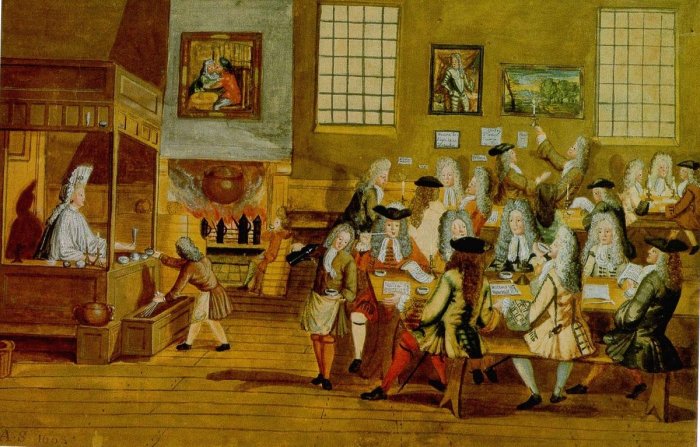King Charles II Of England Banned Coffeehouses In 1675
Ellen Lloyd - AncientPages.com - In 1675, King Charles II of England issued a proclamation to end the legality of coffeehouses. He banned coffeehouses and forbade people from selling coffee, chocolate, sherbet, and tea from any shop or house.
Charles was born on 29 May 1630, the eldest surviving son of Charles I. He was 12 when the Civil War began and two years later was appointed nominal commander-in-chief in western England. With the parliamentary victory, he was forced into exile on the continent. He was in the Netherlands when, in 1649, he learned of his father's execution.
In 1650, Charles made a deal with the Scots and was proclaimed king. With a Scottish army, he invaded England but was defeated by Cromwell at the Battle of Worcester in 1651. He again escaped into exile, and it was not until 1660 that he was invited back to England to reclaim his throne. His past could be the reason why he became suspicious of various plots against him.
In the 17th century, London coffeehouses became very popular. In the late 1600s and early 1700s, there were as many as 3,000 coffee houses in London, and they were a center for gossip. Intellectuals, professionals, and merchants thronged to the coffee houses to debate, distribute pamphlets, do deals, smoke clay pipes, and, of course, to consume a drink.
The popularity of the coffeehouses made King Charles II nervous, and he made an attempt to ban them.
Interior of a London Coffee-house, 17th century. Credit: Public Domain
King Charles II's argument was that coffee houses disturbed the peace of the realm and promoted idleness and some scurrilous and defamatory rumor-mongering. Of course, the true reason why King Charles II wanted to get rid of these meeting places was of a political nature. He suspected coffeehouses offered a perfect opportunity for plotting sedition and treason among the population.
A PROCLAMATION
FOR THE
Suppression of Coffee-Houses.
CHARLES R.Whereas it is most apparent, that the Multitude of Coffee-Houses of late years set up and kept within the Kingdom, the Dominion of Wales, and the Town of Berwick on Tweed, and the great resort of Idle and disaffected persons to them, have produced very evil and dangerous effects; as well for that many Tradesmen and others, do therein mis-spend much of their time, which might and probably would otherwise by imployed in and about their Lawful Callings and Affairs; but also, for that in such houses, and by occasion of the meetings of such persons therein, diverse False, Malitious and Scandalous Reports are devised and spread abroad, to the Defamation of His Majesties Government, and to the Disturbance of the Peace and Quiet of the Realm; his Majesty hath thought it fit and necessary, That the said Coffee-houses be (for the future) put down and supressed, and doth (with the Advice of his Privy council) by this Royal Proclamation, Strictly Charge and Command all manner of persons, That they or any of them do not presume from and after the Tenth Day of January next ensuing, to keep any Publick Coffee-house, or to Utter or sell by retail, in his, her, or their house or houses (to be spent or consumed within the same) any Coffee, Chocolet, Sherbett or Tea, as they will answer the contrary at their utmost perils.
And for the better accomplishment of this his Majesties Royal Pleasure, his Majesty both hereby will and require the Justices of the Peace within their several Counties, and the Chief Magistrates in all Cities and Towns Corporate, that they do at their next respective General Sessions of the peace (to be holden within their several and respective Counties, Divisions and Precincts) recall and make void all Licences at any time heretofore Granted, for the selling or retailing of any Coffee, Chocolet, Sherbett or Tea. And that they or any of them do not (for the future) make or grant any such Licence or Licences to any persons whatsoever. And his Majesty doth further hereby declare, that if any person or persons shall take upon them, him or her, after his, her or their Licence or Licences recalled, or otherwise without Licence, to sell by retail (as aforesaid) any of the Liquors aforesaid, that then the person or persons so Offending, shall not only be proceeded against , upon the Statute made in the fifteenth year of his Majesties Reign (which gives the forfeiture of five pounds for every moneth wherein he, she or they shall offend therein) but shall (in case they persevere to Offend) receive the severest punishments that may by Law be inflicted.
Given at our Court at Whitehall, the Nine and twentieth day of December 1675, in the Seven and twentieth year of Our Reign.
God save the King
The law to ban coffeehouses was passed on December 29, 1675, and was supposed to become active on January 10, 1676, but it was abolished on January 8. The undoing of the ban was backed by several ministers of Charles II, who themselves were lovers of coffee.
Written by - Ellen Lloyd – AncientPages.com
Copyright © AncientPages.com All rights reserved. This material may not be published, broadcast, rewritten or redistributed in whole or part without the express written permission of AncientPages.com
Expand for referencesReferences
The Old Foodie
More From Ancient Pages
-
 Glooskap (Gluskap): Mythical Hero Who Defeated Evil Sorcerers And Demon Followers
Featured Stories | Jan 25, 2016
Glooskap (Gluskap): Mythical Hero Who Defeated Evil Sorcerers And Demon Followers
Featured Stories | Jan 25, 2016 -
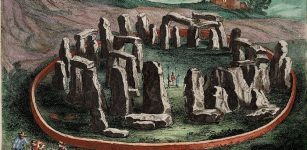 Hunter-Gatherers Used Open Habitats Millennia Before Stonehenge Monuments Were Built
Archaeology | Apr 27, 2022
Hunter-Gatherers Used Open Habitats Millennia Before Stonehenge Monuments Were Built
Archaeology | Apr 27, 2022 -
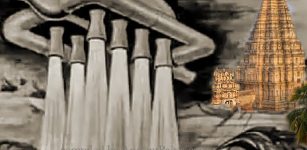 Vimanas Of The Rama Empire: Flying Machines Dominated Ancient Skies In Distant Past
Ancient Technology | Jul 23, 2017
Vimanas Of The Rama Empire: Flying Machines Dominated Ancient Skies In Distant Past
Ancient Technology | Jul 23, 2017 -
 Ancient DNA Reveals How Yamnaya People Re-Wrote Northern Europeans’ Genetic Story 5,000 Years Ago
DNA | Jan 12, 2024
Ancient DNA Reveals How Yamnaya People Re-Wrote Northern Europeans’ Genetic Story 5,000 Years Ago
DNA | Jan 12, 2024 -
 Mask Of Shame: Worn In Ancient Times As Punishment For Gossiping
Ancient History Facts | Jan 5, 2017
Mask Of Shame: Worn In Ancient Times As Punishment For Gossiping
Ancient History Facts | Jan 5, 2017 -
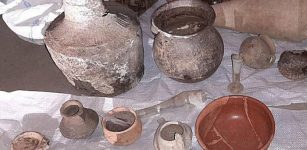 Europol Reports: ‘Millions’ In Stolen Treasures After Busting Crime Gang In Bulgaria – Recovered
Archaeology | Jul 4, 2020
Europol Reports: ‘Millions’ In Stolen Treasures After Busting Crime Gang In Bulgaria – Recovered
Archaeology | Jul 4, 2020 -
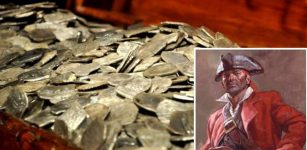 Legendary Pirate Black Sam And His Ship Discovered Off The Coast Of Cape Cod
Archaeology | Feb 12, 2018
Legendary Pirate Black Sam And His Ship Discovered Off The Coast Of Cape Cod
Archaeology | Feb 12, 2018 -
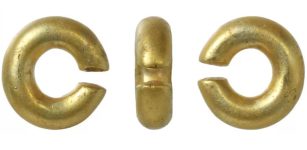 ‘Incredibly Mysterious’ Bronze Age Gold Penannular Ring Found In Norfolk
Archaeology | Apr 24, 2023
‘Incredibly Mysterious’ Bronze Age Gold Penannular Ring Found In Norfolk
Archaeology | Apr 24, 2023 -
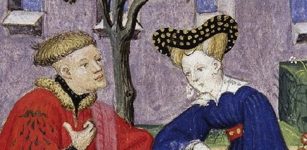 Why Was Lovesickness A Feared Disease During The Middle Ages?
Ancient History Facts | Feb 8, 2018
Why Was Lovesickness A Feared Disease During The Middle Ages?
Ancient History Facts | Feb 8, 2018 -
 4,000-Year-Old Temple With Mysterious Large Monolith Discovered In Cyprus
Archaeology | Jul 10, 2024
4,000-Year-Old Temple With Mysterious Large Monolith Discovered In Cyprus
Archaeology | Jul 10, 2024 -
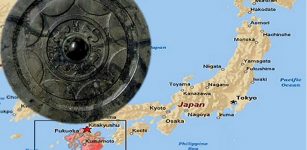 Remarkably Well-Preserved 1,900-Year-Old Chinese Bronze Mirror Unearthed In Japan
Archaeology | Dec 29, 2017
Remarkably Well-Preserved 1,900-Year-Old Chinese Bronze Mirror Unearthed In Japan
Archaeology | Dec 29, 2017 -
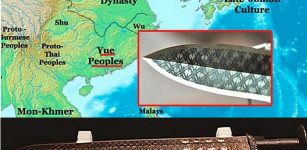 Superior Sword Of Goujian: Jian Weapon And Legend Of Immortal With Good Advice
Artifacts | Oct 15, 2019
Superior Sword Of Goujian: Jian Weapon And Legend Of Immortal With Good Advice
Artifacts | Oct 15, 2019 -
 Lemminkainen: Mythical War-Hero Of Finnish Great Epic ‘Kalevala’
Featured Stories | Oct 14, 2016
Lemminkainen: Mythical War-Hero Of Finnish Great Epic ‘Kalevala’
Featured Stories | Oct 14, 2016 -
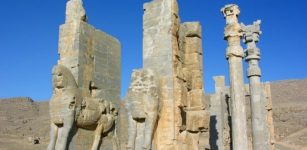 Discovery Of 1500-Year-Old Celestial Observatory Dated To Sassanian Empire
Archaeology | Mar 16, 2017
Discovery Of 1500-Year-Old Celestial Observatory Dated To Sassanian Empire
Archaeology | Mar 16, 2017 -
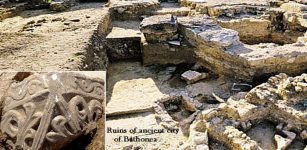 Excavations In Ancient City Of Bathonea Reveal Traces Of Viking Settlement
Archaeology | Aug 27, 2020
Excavations In Ancient City Of Bathonea Reveal Traces Of Viking Settlement
Archaeology | Aug 27, 2020 -
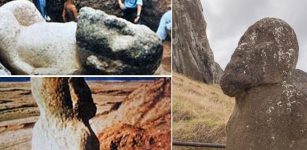 Unusual Tukuturi Statue On Easter Island Remains An Unexplained Mystery
Civilizations | Jan 16, 2019
Unusual Tukuturi Statue On Easter Island Remains An Unexplained Mystery
Civilizations | Jan 16, 2019 -
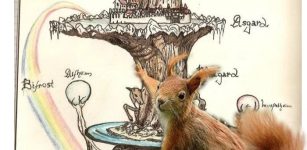 Ratatoskr- Inhabitant Of Yggdrasil That Loves Intrigue, Strife And Gossips In Norse Beliefs
Featured Stories | May 28, 2020
Ratatoskr- Inhabitant Of Yggdrasil That Loves Intrigue, Strife And Gossips In Norse Beliefs
Featured Stories | May 28, 2020 -
 Ancient History Of Body Modification In Mesoamerica Practiced By The Aztecs, Maya And Olmecs
Ancient Traditions And Customs | Jul 12, 2017
Ancient History Of Body Modification In Mesoamerica Practiced By The Aztecs, Maya And Olmecs
Ancient Traditions And Customs | Jul 12, 2017 -
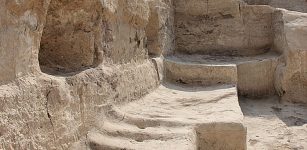 Ancient Adobe Throne Found At Aslantepe, An Acient Hittite Site, Turkey
Civilizations | Aug 29, 2015
Ancient Adobe Throne Found At Aslantepe, An Acient Hittite Site, Turkey
Civilizations | Aug 29, 2015 -
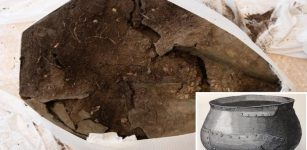 Rare Ancient Roman Cauldron Discovered In Central Norway
Archaeology | Sep 16, 2019
Rare Ancient Roman Cauldron Discovered In Central Norway
Archaeology | Sep 16, 2019


